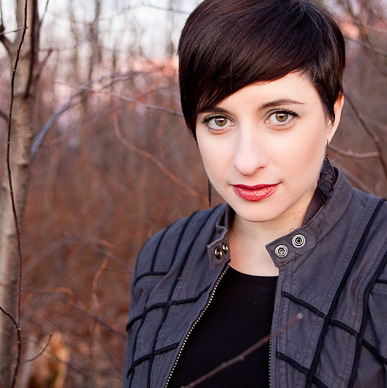Jennifer Flescher: One of the things autobiographical writers often discuss is concern for the actual people involved. How do you deal with that in your writing? How did you deal with that in “No Such Thing as a Small Secret?”
Debbie Bradford: This is something I agonize over in a lot of my writing. My teenage years were full of moments many of the participants would not want to see recorded in print. I am just starting to publish work about this time period, so it is still new terrain for me but I’m starting to get the hang of it. For “No Such Thing as a Small Secret,” I changed some names and I tried to find the balance between the needs of the story and the needs of the real people about whom I’m writing. There was a section in earlier drafts that might have cast someone I love in a less than positive light. While revising, I realized that the story did not need that part in order to work. When possible, I’d rather cut words than harm a person. I’m glad I made the choice I did. This will likely be a more troublesome issue in some of my other stories. I hope to have a clearer answer before I publish them.
JF: Did you talk to anyone from your family or your past during the writing of this essay?
DB: I’m not sure if this is true for all twins, but a funny thing about my sister and me is that even though we grew up in the same house at the same time, we seem to have had remarkably different childhoods. It’s always a riot to show a story draft to my sister – which of course I do with every story I write, whether she’s “ready-to-know” or not – and hear her version of the events. A few parts of this story are actually Amy’s memories that had to be re-implanted in my head.
My family is very supportive of my writing. My father is a writer too – though I think he wishes I would write fiction, or at least call what I am writing fiction. At different points during the drafting of this story, my mother, my other mother, my father and my sister all read and offered feedback – and cheerleading.
For this story, I mostly talked to my family (yes, I got the OK from my mom about the “back massager”), but for some of the other teenage years pieces I’m working on, I have contacted people from my past that I probably have no business contacting – ex-friends and ex-boyfriends evicted from my life for good reason, now back in my world through, you guessed it, Facebook.
JF: The story seems to have had a lot to do with what you were afraid would happen that never did. Did you edit it to keep it focused on fear and love? Or did you or your mom ever face the kind of discrimination that scared you?
DB: I don’t recall any explicit demonstrations of homophobia. The discrimination was mostly behind-the-scenes: people talking about us, distancing themselves. But it was also bigger than that – societal, more pervasive. My mother stayed “closeted” until she left Texas, so my guess is that she was aware of, or experienced more, discrimination.
I think she worked hard to keep my sister and me sheltered from it and she actively looked for places where we would feel supported, including a group for teenagers with gay parents: TRUST (Teens Relating Unique Situations Together). As the group’s euphemistic title implies, even “open” was still mostly closed. When researching for this story, I came across a quote from the group’s founder. She said: “As a parent, you have to ask yourself, ‘do you have the right to shove your ideas down a child’s throat when it’s so different from society’s norm?’” That ought to give some idea of the atmosphere in which my story takes place.
JF: Your experience is complicated–it was personal and societal at the same time. Did you have the opportunity to think about it that way when you were young? Do you think about it that way now?
DB: My ability to see the bigger picture was not well-developed back then. I was preoccupied with being a rebellious, angsty teenager – I was really very good at it. Now, I see the connection between the anger I felt and how difficult it was to be part of a non-traditional family in Dallas, TX in the 1990s. If my mother didn’t have to hide who she was and therefore ask me to keep this big secret, my teenage years likely would have been different. The pressure on her was enormous, and bound to push on the children she was trying to protect, however noble her intentions.
JF: You could have chosen to start and end in many different points of this essay, and the title refers to the “secret” of it all. Yet you begin with your mother’s voice and end with the word “home.” How did you come to that choice?
DB: Part of the answer is that back when my parents divorced and my mother came out, I felt betrayed – like I’d been lied to my whole life. The opening scene of my story alludes to my mother’s denial; she hadn’t just been lying to me and Amy, or my father, but to herself as well. Even so, the feeling that something terrible had been done to me was tough to overcome. It’s hard to find empathy for a person by whom you feel hurt or who you feel didn’t consider your needs. It took me a long time to find my way back to my mother, but I think the closing scene shows that I was at least open to the possibility in that moment.
The other part of the answer is that the secret was really my mom’s, not mine. Imagine having to keep something so big, something that informed every part of your life, hidden – something as big as your marriage. While I was struggling to figure out how her so-called “choice” impacted me, she was struggling to figure out how to live it – made all the more complicated by a daughter sneaking out of the house and being brought home by the police on a semi-regular basis.
JF: What do you think was the biggest thing you learned about yourself writing this piece?
DB: I used to blame my mother – both parents really – for the anger I felt during my teenage years. When I wrote this essay, I thought it would become the beginning of my memoir about that time, since it seemed this was the thing that set me off, set me on the track to becoming a collector of traumas. Through writing this piece, I began to realize that, while maybe the break-up of my family was the catalyst that started me acting out, the experiences stemming from that acting out shaped me more. I no longer believe my anger at my parents was the primary fuel for my rebellion, and therefore, I no longer see this story as the beginning of my book. And you’ll just have to read it if you want to know more…
JF: In your essay you begin with your mother’s question, “What do you look for in someone you love?”. Now that you are married, with a daughter of your own, how do you hope that she will answer that question one day?
DB: My mother and her wife have been a model for my sister and me as to what makes a healthy relationship. They work incredibly hard to support and understand each other and to function as a team. My husband and I strive for the same. I hope that for my daughter, it will be a question that doesn’t need to be asked – that she will assume this is what she deserves and what she will have: a partner who respects, supports and loves her – the way my moms do.
Jennifer S. Flescher is a freelance journalist working and living in Newton, MA. Her poetry publications include The Harvard Review, Fulcrum, Lit and The Boston Globe. Her non-fiction publications include Agni-Online, Jubilat, Perihelion, and Poetry Daily. She is editor and publisher of Tuesday; An Art Project.



Debbie’s work has always fascinated me and as a close relative, I’ve had the honor of reading it from very early on. As a younger person her gift might have been described as the need for searing honesty. As an adult, her ability to step back to understand not only her needs, but her sensitivity to the motives and desires of others, is gratifying to one who loves her and fascinating to one who looks forward to the publication of every piece she produces.
I so love reading Debbie’s work. And this interview was like reading even more. The honesty, the emotional honesty, is something I treasure so much and yet find so seldom. And I can’t help thinking that’s in direct opposition to her father’s wish for her to at least call what she writes fiction.